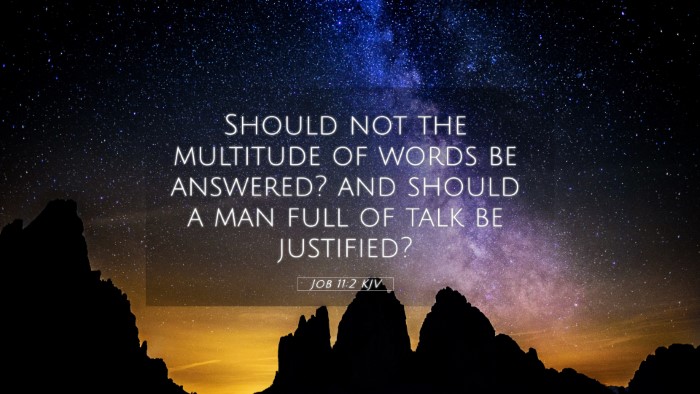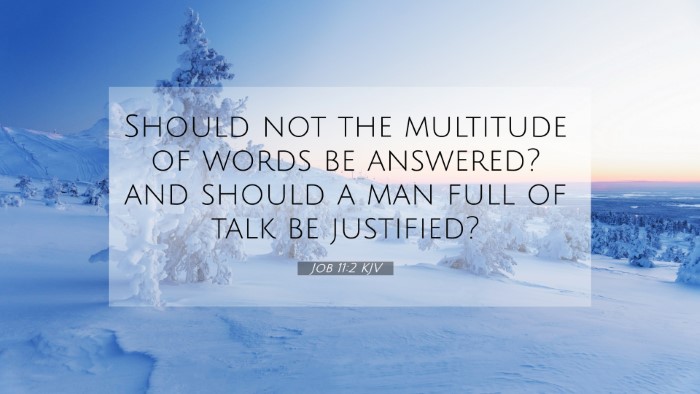Old Testament
Genesis Exodus Leviticus Numbers Deuteronomy Joshua Judges Ruth 1 Samuel 2 Samuel 1 Kings 2 Kings 1 Chronicles 2 Chronicles Ezra Nehemiah Esther Job Psalms Proverbs Ecclesiastes Song of Solomon Isaiah Jeremiah Lamentations Ezekiel Daniel Hosea Joel Amos Obadiah Jonah Micah Nahum Habakkuk Zephaniah Haggai Zechariah MalachiJob 11:2 Similar Verses
Job 11:2 Cross References
Should not the multitude of words be answered? and should a man full of talk be justified?
Uncover the Rich Themes and Topics of This Bible Verse
Listed below are the Bible themes associated with Job 11:2. We invite you to explore each theme to gain deeper insights into the Scriptures.
Job 11:2 Cross Reference Verses
This section features a detailed cross-reference designed to enrich your understanding of the Scriptures. Below, you will find carefully selected verses that echo the themes and teachings related to Job 11:2 KJV. Click on any image to explore detailed analyses of related Bible verses and uncover deeper theological insights.

Job 18:2 (KJV) »
How long will it be ere ye make an end of words? mark, and afterwards we will speak.

Proverbs 10:19 (KJV) »
In the multitude of words there wanteth not sin: but he that refraineth his lips is wise.

Job 8:2 (KJV) »
How long wilt thou speak these things? and how long shall the words of thy mouth be like a strong wind?

Psalms 140:11 (KJV) »
Let not an evil speaker be established in the earth: evil shall hunt the violent man to overthrow him.

Acts 17:18 (KJV) »
Then certain philosophers of the Epicureans, and of the Stoicks, encountered him. And some said, What will this babbler say? other some, He seemeth to be a setter forth of strange gods: because he preached unto them Jesus, and the resurrection.

James 1:19 (KJV) »
Wherefore, my beloved brethren, let every man be swift to hear, slow to speak, slow to wrath:
Job 11:2 Verse Analysis and Similar Verses
Understanding Job 11:2
Job 11:2 states: "Should not the multitude of words be answered? And should a man full of talk be justified?" This verse presents Zophar's challenge to Job, emphasizing the need for a response to Job's extensive lamentations and discussions regarding his suffering.
Verse Interpretation
In this passage, Zophar the Naamathite speaks to Job, addressing the complexities of his situation and the profoundness of his words. Zophar believes that Job's assertions regarding his innocence warrant a counter-argument. The emphasis here is on the volume and weight of words in light of divine justice.
Insights from Public Domain Commentaries
-
Matthew Henry's Commentary:
Henry notes that the plethora of Job's words signifies his emotional turmoil. Zophar, representing a more dogmatic perspective, suggests that Job's extensive lament is disproportionate, and he implies that such discourse cannot lead to innocence in the face of suffering. Job's reliance on his own understanding of his plight is portrayed as deeply flawed.
-
Adam Clarke's Commentary:
Clarke emphasizes the rhetorical nature of Zophar's questions, indicating that this is a call to Job to recognize the limits of his speak. Clarke interprets the phrase "full of talk" as a symptom of Job's misguided attempts to defend himself without submitting to divine authority. Zophar's insistence on answering Job underscores the expectation of humility before God.
-
Albert Barnes' Notes:
Barnes points out that Zophar’s rhetoric serves not merely as a rebuke but also raises a greater issue of the relationship between divine wisdom and human speech. He suggests that Zophar misunderstands the true nature of Job's struggles; thus, his response is both dismissive and a call for Job to reevaluate his understanding of God's justice.
Key Themes and Connections
This verse opens up thematic connections regarding the dialogue between human experience and divine wisdom, particularly through the lens of suffering and justification. It's critical to understand how this verse interacts with other biblical texts.
Bible Verse Cross-References
- Job 9:2 – "Indeed I know that this is true. But how can mere mortals prove their innocence before God?"
- Job 13:23-24 – "How many wrongs and sins have I committed? Show me my offense and my sin. Why do you hide your face and consider me your enemy?"
- Job 32:1-2 – "So these three men stopped answering Job, because he was righteous in his own eyes. But Elihu, son of Barakel the Buzite, of the family of Ram, became very angry with Job for justifying himself rather than God."
- Proverbs 18:2 – "Fools find no pleasure in understanding but delight in airing their own opinions."
- Ecclesiastes 5:2 – "Do not be quick with your mouth, do not be hasty in your heart to utter anything before God. God is in heaven and you are on earth, so let your words be few."
- James 1:19 – "My dear brothers and sisters, take note of this: Everyone should be quick to listen, slow to speak and slow to become angry."
- Proverbs 21:23 – "Those who guard their mouths and their tongues keep themselves from calamity."
Thematic Bible Verse Connections
When examining Job 11:2 alongside the provided references, one can see how the struggle for justification, the consequences of speech, and the nature of divine wisdom are unwavering themes. This verse and its surrounding context encourage a reflective approach to understanding suffering and communication with God.
Comparative Bible Verse Analysis
There is a significant interplay between the wisdom literature in the Bible and the dialogues of Job. The profound inquiries posed by Zophar challenge us to consider:
- What role does human speech play in articulating our relationship with God?
- How does suffering influence our understanding of justice and righteousness?
- In what ways can the emphasis on listening and understanding deepen our faith amidst trials?
Conclusion
Job 11:2 invites us to reflect on the implications of our words and thoughts before God. As Zophar implores Job with a call to introspection, we are reminded to dig deeper into our own spiritual understandings, employing tools for Bible cross-referencing to uncover the vast connections that exist within the Scripture. This encourages an enriched understanding of thematic links and prophetic dialogues spanning both the Old and New Testaments.
The examination of such verses propels a deeper engagement with the texts and inspires a commitment to searching for answers that resonate within the entirety of Scripture.



